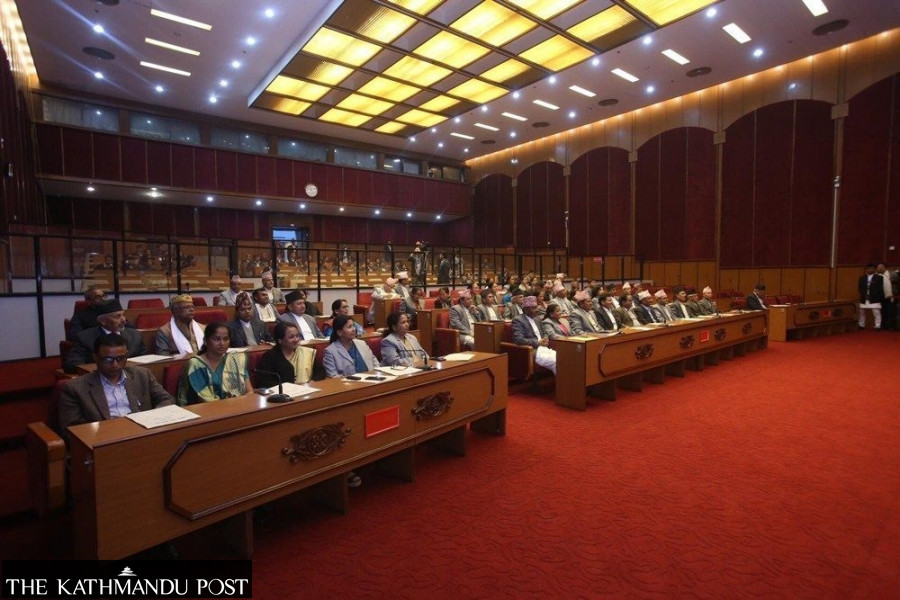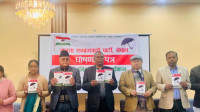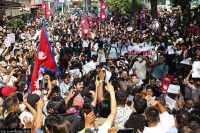National
UML the main sufferer yet a winner in National Assembly elections
The main opposition continues to be the largest party in the upper house despite losing seven seats. The ruling alliance wins in all provinces except Province 1.
Binod Ghimire
The National Assembly elections on Wednesday meant a big loss for the CPN-UML, as expected, as the five-party ruling alliance fought jointly to secure 18 of the 19 seats up for grabs in the upper house. The UML, however, continues to be the largest party in the Assembly with 16 seats, even though it lost seven.
The Nepali Congress won six seats, the Communist Party of Nepal (Maoist Centre) and the Communist Party of Nepal (Unified Socialist) won five seats each while the Janata Samajbadi Party and the Rastriya Janamorcha Party won one seat each.
The UML managed to win a seat from Province 1.
Voting took place in all seven provinces on Wednesday.
The five parties in the ruling alliance—Nepali Congress, the Maoist Centre, CPN (Unified Socialist), the Janata Samajbadi Party and the Rastriya Janamorcha—had fielded the candidates by splitting the 19 seats among themselves.
The main opposition UML contested the election alone in all six provinces except in Madhes Province where it had formed an alliance with the Loktantrik Samajbadi Party, a splinter of the Janata Samajbadi Party.
The results, which were declared by the Election Commission late on Wednesday evening, continue to make the UML the party with the highest number of seats in the upper house.
The UML managed to win in Province 1, largely because of cross-voting. The alliance had a clear edge on the UML in the province.
The five parties had a total weightage of 4,668 while the UML had 4,524. As one of UML’s provincial assembly members is absconding, its strength was further reduced to 4,476.
The electoral college composed of the members of provincial assembly and mayors/chairpersons and deputy mayors/vice-chairpersons at the local level vote for the National Assembly members. Each provincial assembly member's vote has a weight of 48 whereas each chairperson/mayor/vice-chairperson/deputy mayor's vote carries a weight of 18.
Leaders from the alliance say there was cross voting in Province 1.
“Cross-voting by provincial assembly members and representatives from the local units led to the victory of the UML in Province 1,” Rajib Koirala, an assembly member from the Nepali Congress in Province 1, told the Post. “We will analyse it minutely later.”
He said all three candidates from the province would have won the polls if the alliance’s votes were intact.
Sonam Gyaljen Sherpa of the UML made it to the upper house with a vote weightage of 4,734 against Janata Samajbadi Party’s Hemraj Rai, whose vote weightage was 4,368.
Ashok Rai, a senior leader of the Janata Samajbadi Party, said they faced a defeat as the coalition culture was not followed.
“Voters from the party didn’t act as per the spirit of coalition,” Rai told the Post.
With the defeat, the UML’s strength in the upper house has shrunk to 16 from 23, excluding chairperson Ganesh Timilsina. However, it still remains the largest party.
The Maoist Centre, which had 13 seats, has gained one seat from Wednesday's election, taking its total strength to 14, excluding vice-chairperson Shashikala Dahal.
After winning six seats, the Nepali Congress now has 10 seats while the CPN (Unified Socialist) has eight seats in the upper house. The Janata Samajbadi Party has added one seat to have three members in the upper house.
Rastriya Janamorcha has managed to have its presence in the upper house for the first time with one seat.
Gopal Kumar Basnet from Province 1, Krishna Prasad Poudel from Bagmati, Kamala Panta from Gandaki, Yubaraj Sharma from Lumbini, Durga Kumari Gurung from Karnali, and Narayandutta Mishra from Sudurpaschim provinces have emerged victorious from the Congress.
Urmila Aryal from Madhes; Suresh Ale Magar from Gandaki; Bharat Sunar and Nar Bahadur Bista from Karnali Province; and Jagat Parki registered their wins for the Maoist Centre.
Jayanti Rai from Province 1 and Goma Timilsina from Bagmati, Rajya Laxmi Gaire from Lumbini, Udaya Bohora from Karnali and Madan Kumari Shah from Sudurpaschim have made it to the upper house from the CPN (Unified Socialist).
Mohammad Khalid of the Janata Samajbadi Party won from Madhes.
Tul Prasad Bishwakarma, a Rastriya Janamorcha leader from Lumbini Province, has secured his position in the upper house.
Loktantrik Samajbadi Party, Rastriya Prajatantra Party and Nepal Majdoor Party, which were in the race, failed to secure any seats in the upper house.
“Candidates from six parties have made it to the upper house,” Shaligram Sharma Poudel, spokesperson for the Election Commission, told the Post.
As per the constitution, the National Assembly has 59 members—56 elected and three nominated by the President on the recommendation of the Council of Ministers.
Each of the seven provinces elects eight members to the upper house.
The members’ terms are staggered—from two to six years—and such terms are decided through lots for the first time.
The 19 members, who retire on March 4, had drawn their lots in June 2018. Voting to elect 18 members who had their terms for two years took place in January 2019. The remaining 20 members will have their six-year term completed in March 2024.
Bishal Bhattarai, the UML chief whip, said his party was rather happy that it won a seat [in Province 1] as the ruling party voters crossed the floor.
“Not just in Province 1, we have received votes from other parties in Madhes, Gandaki and Sudurpaschim as well,” said Bhattarai. “We alone were close competitors despite the fact that the five parties from the ruling alliance were fighting jointly.”




 18.12°C Kathmandu
18.12°C Kathmandu















